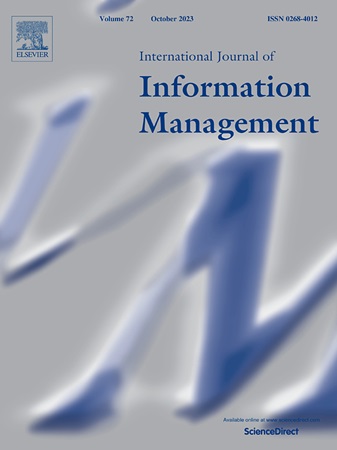Impact of AI on firm ambidextrous innovation: Mediating role of digital knowledge coupling
IF 27
1区 管理学
Q1 INFORMATION SCIENCE & LIBRARY SCIENCE
International Journal of Information Management
Pub Date : 2025-06-07
DOI:10.1016/j.ijinfomgt.2025.102935
引用次数: 0
Abstract
Amid rapid technological advancement, artificial intelligence (AI) has emerged as a crucial driver of innovation. However, the mechanisms through which AI adoption affects firm technological innovation capabilities remain insufficiently understood. Using a sample of 277 Chinese manufacturing firms from 2015 to 2023, this study analyzes the impact of AI on firm ambidextrous innovation and the mediating role of digital knowledge coupling. The findings demonstrate that AI strengthens exploitative and exploratory innovation capabilities, though its effect on the former is more substantial. Existing digital knowledge coupling is a positive mediator in the relationship between AI and exploitative innovation but functions as a negative mediator in AI’s relationship with exploratory innovation. New digital knowledge coupling positively mediates AI’s effect on exploitative and exploratory innovation. The presence of a chief information officer (CIO) weakens AI’s positive effect on existing digital knowledge coupling, while an executive digital background strengthens AI’s impact on new digital knowledge coupling. AI’s innovation-enabling effects are more potent for non-SOEs and high-tech industries. This study contributes to the literature by illuminating the complex interplay between AI adoption, digital knowledge structures, and firm technological innovation, thereby providing valuable insights for managers seeking to leverage AI for balanced innovation outcomes in an increasingly digital competitive landscape.
人工智能对企业双灵巧创新的影响:数字知识耦合的中介作用
随着技术的快速发展,人工智能(AI)已成为创新的关键驱动力。然而,人工智能采用影响企业技术创新能力的机制仍然没有得到充分的了解。本文以2015 - 2023年277家中国制造业企业为样本,分析了人工智能对企业双灵巧创新的影响以及数字知识耦合的中介作用。研究结果表明,人工智能增强了剥削性和探索性创新能力,尽管其对前者的影响更为实质性。现有数字知识耦合在人工智能与探索性创新的关系中为负向中介,在人工智能与剥削性创新的关系中为正向中介。新的数字知识耦合正向中介人工智能对剥削性创新和探索性创新的影响。首席信息官(CIO)的存在削弱了人工智能对现有数字知识耦合的积极影响,而高管数字背景则增强了人工智能对新的数字知识耦合的影响。人工智能的创新赋能效应对非国有企业和高科技产业更为强大。本研究阐明了人工智能采用、数字知识结构和企业技术创新之间复杂的相互作用,从而为寻求在日益数字化的竞争格局中利用人工智能实现平衡创新成果的管理者提供了有价值的见解。
本文章由计算机程序翻译,如有差异,请以英文原文为准。
求助全文
约1分钟内获得全文
求助全文
来源期刊

International Journal of Information Management
INFORMATION SCIENCE & LIBRARY SCIENCE-
CiteScore
53.10
自引率
6.20%
发文量
111
审稿时长
24 days
期刊介绍:
The International Journal of Information Management (IJIM) is a distinguished, international, and peer-reviewed journal dedicated to providing its readers with top-notch analysis and discussions within the evolving field of information management. Key features of the journal include:
Comprehensive Coverage:
IJIM keeps readers informed with major papers, reports, and reviews.
Topical Relevance:
The journal remains current and relevant through Viewpoint articles and regular features like Research Notes, Case Studies, and a Reviews section, ensuring readers are updated on contemporary issues.
Focus on Quality:
IJIM prioritizes high-quality papers that address contemporary issues in information management.
 求助内容:
求助内容: 应助结果提醒方式:
应助结果提醒方式:


